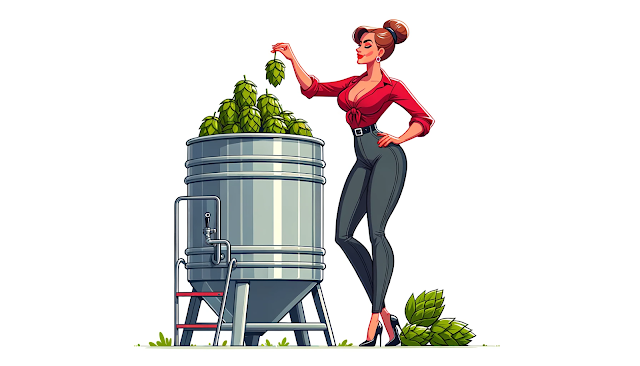Those glorious, resinous, fragrant flowers that have become the beating heart of countless beers worldwide!
If brewing were an orchestra, then hops would undoubtedly be the lead violin, setting the tone and pace for every other ingredient to follow.
Let's talk about versatility. Hops are the Swiss Army knife of the brewing world. Want to add bitterness to counteract the sweetness of malt? Hops are there for you. Looking for a citrusy, piney, or floral aroma to tantalize the senses?
Let's talk about versatility. Hops are the Swiss Army knife of the brewing world. Want to add bitterness to counteract the sweetness of malt? Hops are there for you. Looking for a citrusy, piney, or floral aroma to tantalize the senses?
Hops step up to the plate. Need a natural preservative to ensure your brew stays fresh for longer? Yet again, our trusty hops come to the rescue.
And the diversity! The sheer number of hop varieties available to brewers is staggering. Each brings its own unique blend of flavors and aromas to the table, from the grapefruit notes of Cascade to the earthy tones of Fuggle. It's a veritable playground for brewers, allowing for endless experimentation and innovation.
Furthermore, hops are a testament to the skill and dedication of growers and harvesters. Cultivating hops is no small feat; it requires an intimate knowledge of the land, climate, and the specific needs of each variety. These hardworking individuals ensure that brewers have the best possible ingredients at their disposal, allowing them to craft beers of unparalleled quality.
And the diversity! The sheer number of hop varieties available to brewers is staggering. Each brings its own unique blend of flavors and aromas to the table, from the grapefruit notes of Cascade to the earthy tones of Fuggle. It's a veritable playground for brewers, allowing for endless experimentation and innovation.
Furthermore, hops are a testament to the skill and dedication of growers and harvesters. Cultivating hops is no small feat; it requires an intimate knowledge of the land, climate, and the specific needs of each variety. These hardworking individuals ensure that brewers have the best possible ingredients at their disposal, allowing them to craft beers of unparalleled quality.
But let's not forget the role of hops in the history of beer.
The use of hops can be traced back over a millennium! Monks in medieval Europe recognized the value of hops not just for flavor, but for their antibacterial properties, which helped preserve beer in an era before refrigeration.
Today, thanks to hops, we can enjoy IPAs, stouts, lagers, and countless other styles that are loved worldwide.
- What is a hop schedule on brewing day?
- What is the difference between whole lead hop and pellet hops?
- What is a hops tea for adding to beer wort?
- How to store opened hops?
- When to pitch hops into the beer wort?
- How to dry hop when brewing
- Using hops to make beer bitter
- What is a hop schedule for brewing day?
- How to properly store opened hops
- How long to leave hops in the beer fermenting drum?
- Hops: to fridge or freeze?
- Does dry hopping effect the metabolism of yeast?
In essence, hops are nothing short of magical. They transform simple water, grain, and yeast into a symphony of flavors, ranging from the bitter to the aromatic, the subtle to the bold. They are the unsung heroes of the brewing process, deserving of every accolade and every toast raised in their honor.

